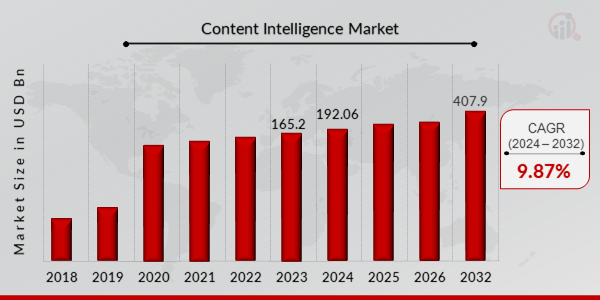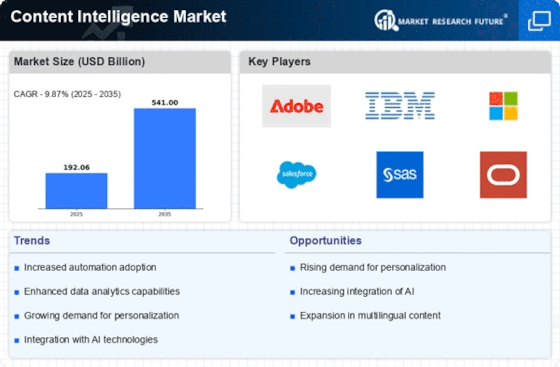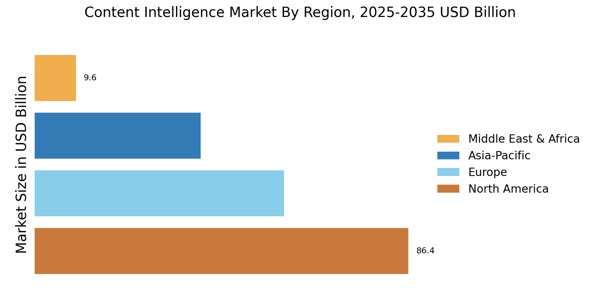Integration of Advanced Analytics
The integration of advanced analytics into the Content Intelligence Market is transforming how organizations approach content creation and distribution. By utilizing sophisticated data analysis tools, companies can derive actionable insights from vast amounts of content data. This capability allows for the identification of trends, audience preferences, and content performance metrics. According to recent studies, organizations that implement data-driven content strategies can achieve up to a 30% increase in engagement rates. As a result, the demand for content intelligence solutions that incorporate advanced analytics is likely to grow, enabling businesses to optimize their content strategies effectively.
Growing Demand for Personalization
The Content Intelligence Market is experiencing a notable surge in demand for personalized content experiences. As consumers increasingly expect tailored interactions, businesses are compelled to leverage content intelligence solutions to analyze user data and preferences. This trend is underscored by a report indicating that 80% of consumers are more likely to make a purchase when brands offer personalized experiences. Consequently, organizations are investing in advanced analytics and machine learning technologies to enhance their content strategies. This shift not only improves customer engagement but also drives conversion rates, thereby solidifying the role of content intelligence in modern marketing strategies.
Emergence of Voice and Visual Search
The rise of voice and visual search technologies is reshaping the Content Intelligence Market. As consumers increasingly utilize voice-activated devices and visual search tools, businesses must adapt their content strategies to remain relevant. This shift necessitates the optimization of content for these emerging search modalities, which can significantly enhance user experience. Research indicates that over 50% of all searches will be voice-based by 2025, prompting organizations to invest in content intelligence solutions that facilitate this transition. Consequently, the ability to analyze and optimize content for voice and visual search is becoming a critical driver in the content intelligence landscape.
Regulatory Compliance and Data Privacy
The Content Intelligence Market is also influenced by the growing emphasis on regulatory compliance and data privacy. As governments worldwide implement stricter data protection regulations, organizations must ensure that their content strategies align with these legal requirements. This necessity drives the demand for content intelligence solutions that can help businesses manage and analyze data responsibly. Companies that prioritize compliance not only mitigate risks but also build trust with their customers. The increasing complexity of data privacy laws is likely to propel the adoption of content intelligence tools that facilitate compliance while enhancing content effectiveness.
Shift Towards Agile Content Development
The shift towards agile content development methodologies is significantly impacting the Content Intelligence Market. Organizations are increasingly adopting agile practices to enhance their content creation processes, allowing for quicker responses to market changes and consumer demands. This approach emphasizes collaboration, flexibility, and iterative improvements, which are essential in today’s fast-paced digital landscape. As a result, content intelligence solutions that support agile workflows are becoming more sought after. Companies that embrace this shift can expect to see improved content quality and relevance, ultimately leading to better audience engagement and retention.

















